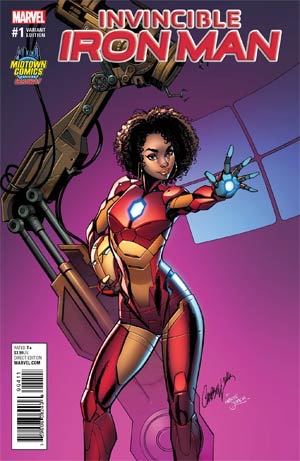The comic world has been getting a little rowdy lately, from one comic shutting down to yet another conversation about the room for feminists in comics.
That being said, another issue has popped up that piqued my interest. Another “we’re having this conversation again?” kind of problem.
A few months ago, I wrote an article introducing Fandom Following to one of our upcoming Marvel stars — Riri Williams, the new Iron Man (now dubbed Ironheart). Her issues are now in circulation, and she is already being treated to some…standard comic protocol for female characters.
Recently some variant covers came out featuring our badass heroine, however one of the covers caught the eyes of many comic book fans and critics alike.

My initial reaction to it was just…one huge eyeroll, along with some choice words. See, there’s three things that the general public knows about Riri:
- She is replacing Iron Man for a time.
- She is one of the most intelligent characters in the Marvel Universe after Moon Girl and a few others.
- Riri is a black 15-year-old.
J. Scott Campbell’s depiction of Riri caused a backlash with the quickness, mostly due to the third point. As an excited reader, this would not be the comic I would want to read. The breasts, the pose, the pants—it’s all derivative of Campbell’s pin-up style, but she’s still an underage girl. Pandering to the audience that Marvel still thinks they’re reaching in totality is of no help, either. Truthfully, she looks…generic. Of course, the criticism fell on deaf ears as Campbell’s response was no better.
I gave her a sassy "attitude"@lilpochaco "sexualizing" was not intended. This reaction is odd. The crop-top was in the existing design.
— J. Scott Campbell♠️? (@JScottCampbell) October 20, 2016
To be clear, he’s the same man who drew this:

Come on now, sexualization was not intended? While I can respect an artist’s genre, I feel like Marvel could have taken a hard pass to Campbell’s depiction of Riri, considering his past work. She looks completely different from the original cover:

The hair is shorter, the skin is lighter. As I said before, her body and the clothing are completely different. In comparison, she looks somehow more infantilized but even sexier in Campbell’s cover, the caricature of Riri rather than the real thing.
Campbell also stated that he had no time for social justice warriors. But, those same warriors had plenty of time for Mr. Campbell. Due to the pressure, the cover was pulled shortly after premiering, although this version of Riri stayed.

To be honest, I would have liked this version better were it not for the “sassy attitude” pose still present. In general, I’m going to need “sassy” to be retired forever when it comes to referring to black women in ANY context. It’s the most tired descriptor of all time, and y’all can do better.
What’s worse is that I’m sensing something unfortunate starting early with this comic—a misunderstanding of Riri’s character, from the perspective of the probably white, probably male artists and writers. This cover felt like they were trying to make her the just cute Iron Man, rather than the complex, secluded MIT student she is. It shows a very basic misunderstanding of what an intelligent, alternative black girl can be.
Thankfully this is only a variant cover, though the problem with treating female comic characters as nothing but fodder for sexually developing male readers remains. Writer Brian Bendis reacted to the cover on his tumblr, but remained mostly neutral to the situation. There’s other artwork of her that I absolutely adore, like so:

However, I have some words once again for Mr. Bendis. As I mentioned at the beginning of my ranticle, Chelsea Cain’s Mockingbird was cancelled due to her being harrassed, launching a debate centered on Cain’s (and feminism’s) place in comics. Her comic’s cover was critiqued as well, mostly for the reason that male readers couldn’t stand to see the word feminist near a comic cover. According to many, it was “too much agenda, not enough story”, while I have heard quite differently. While justifying expressing her feelings towards the comic community, Bendis (you know, the one writing Riri) chimed in that this was not the work of the industry doing this to her. I can only assume he meant that it was instead the people harassing her.
Bendis’ opinion here is rather confusing, considering his stance on Riri’s cover. He’s glad it didn’t go through, but somehow cannot accept that the comic world is definitely flawed towards women? That the flaw IS within the industry’s workings, as well as present in the mindsets of the (rapidly changing) demographic you write for?
Well, I’ll end my piece with a question for Mr. Bendis. Was it not the inner workings of the industry you work for that lead to sexualizing a 15 year old girl with SO many other good qualities? More specifically, the 15 year old that you created? All of us may want to think about that before saying “it’s not comics”. Because it has been, for quite some time.
UPDATE:
J. Scott Campbell posted his “Riri Redux” on Twitter yesterday:

Still his style, but more appropriate. That wasn’t so hard, now was it?


